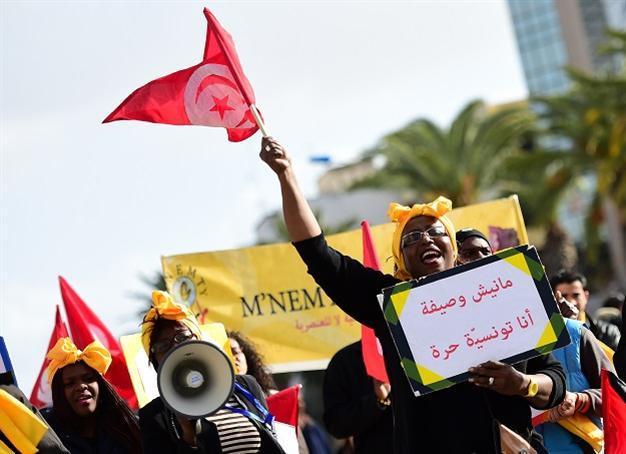Tunisian forces kill nine militants before world leaders attend 'Bardo' march
TUNIS - Reuters

A woman holds a placard shouting slogans during a march at the end of the 2015 World Social Forum (WSF) in Tunis on March 28, 2015. AFP PHOTO / EMMANUEL DUNAND
Tens of thousands of Tunisians marched through the capital in a show of solidarity against Islamist militants on March 29, hours after the government said its forces had killed nine members of a group suspected of carrying out this month's deadly Bardo Museum attack.The March 18 attack in Tunis killed 21 foreign tourists and a policeman, shaking a country that has been praised as a peaceful democratic model since leading the first of the Arab Spring uprisings in 2011.
A red-and-white sea of Tunisian crescent and star flags filled a major boulevard in Tunis where several world leaders, including French President Francois Hollande, planned to rally under the slogan "Le Monde est Bardo" (The World is Bardo).
"We have shown we are a democratic people, Tunisians are moderate, and there is no room for terrorists here," said one of the demonstrators, Kamel Saad. "Today everyone is with us."
Thousands of police and soldiers were positioned around the capital.
One of the most secular countries in the Arab world, Tunisia has mostly avoided violence in the four years since the toppling of autocrat Zine El-Abidine Ben Ali. In contrast with Libya, Yemen and Syria which have plunged into war and chaos, it has adopted a new constitution and held free elections.
But the Bardo massacre was one of the worst attacks in its history. Japanese, Polish, Spanish and Colombian visitors were among those killed in the attack, which the government says was aimed at destroying Tunisia's vital tourism industry.
'Strong response'
"Tunisia wanted France with them, and France is on the side of Tunisia, the origin of the Arab Spring, and now a victim of a hateful act," Hollande said in France after voting in local elections before flying to Tunis.
Italy's Prime Minister Matteo Renzi was also due to take part in the demonstration, along with leaders from Palestine, Poland, Belgium, Libya and Algeria.
Tunisia's Prime Minister Habib Essid earlier told reporters a raid in the southern Gafsa region had killed nine militants from the local group Okba Ibn Nafaa, including Algerian Lokman Abu Sakhr, suspected of orchestrating the museum attack.
"We have killed most of the leaders of Okba Ibn Nafaa who were behind many recent attacks," Essid said. "This is a clear and strong response to terrorism after the Bardo attack."
The Islamic State of Iraq and the Levant (ISIL) claimed the attack, though the Tunisian government has pointed the finger at Okba Ibn Nafaa, which has a base in the Chaambi mountains bordering Algeria.
The group was previously more allied to al Qaeda but has made vague statements on its position toward the ISIL, the al Qaeda splinter group that now controls large parts of Iraq and Syria.
The Tunis attack underscored how Islamist militant loyalties are blurring as they seek a new North African front, especially in Libya, where political chaos and factional fighting has allowed Islamic State to gain an outpost.
The two Bardo gunmen were trained over the border in Libya at camps operated by Tunisian militants, officials say. Both were killed by the security forces.
















